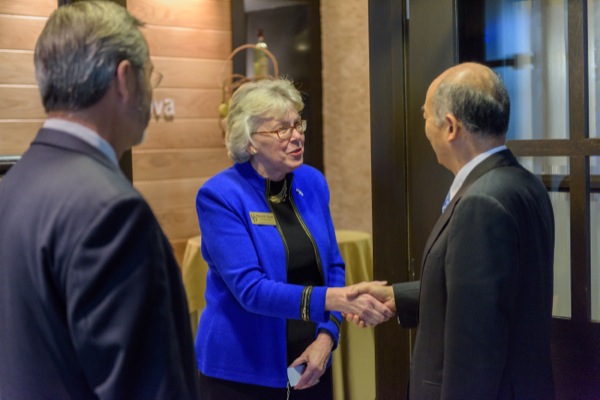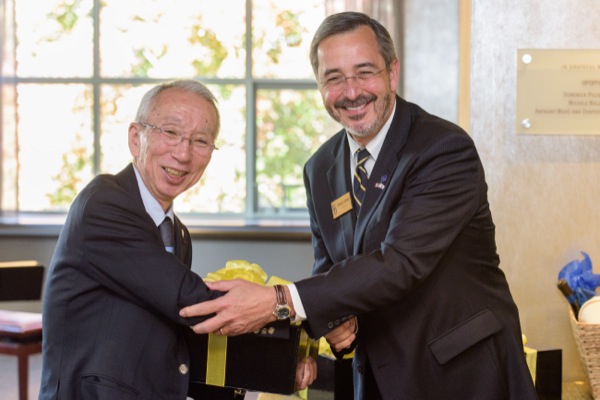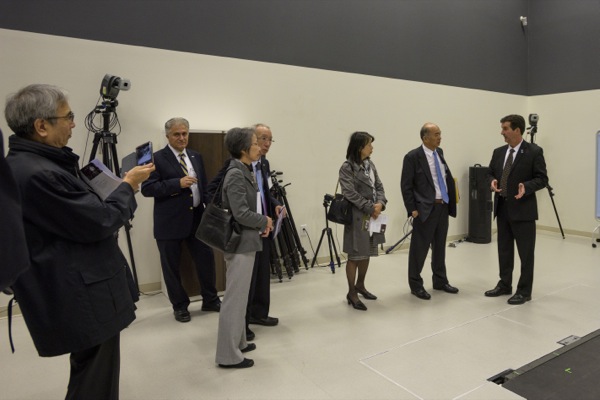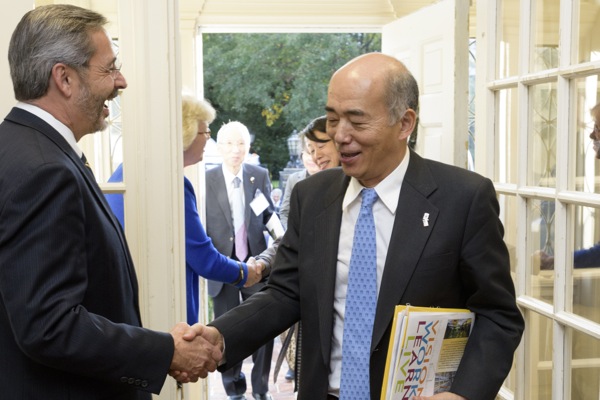

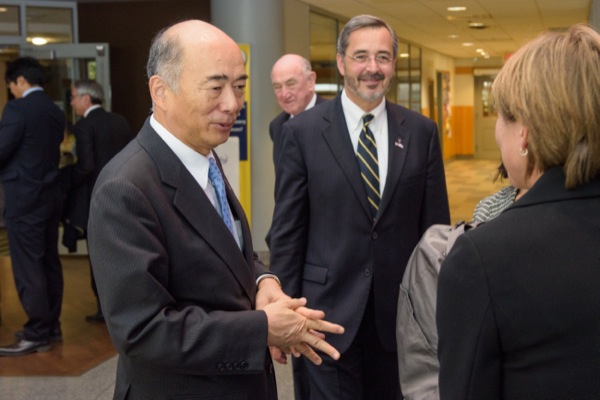
Japanese ambassador welcomed
Opportunities for UD-Japan collaborations focus of visit
3:34 p.m., Oct. 30, 2015--On Monday, Oct. 26, Japanese Ambassador Kenichiro Sasae, his wife Nobuko Sasae and a delegation of experts from Japan and heads of Japanese Society for the Promotion of Science and Japanese Science and Technology Agency based in Washington, D.C., visited the University of Delaware to discuss opportunities for multidisciplinary collaboration.
As Japan looks to the future, the country is increasingly seeking to collaborate with the United States on areas of key innovation, and the University of Delaware has been identified as a potential partner in areas of mutual strategic interest. Possible subjects include fields such as data science, cybersecurity, big data analytics, high performance computing, artificial intelligence, material science and finance.
Global Stories
Fulbright awards
Peace Corps plans
Acting President Nancy Targett and Provost Domenico Grasso hosted the group for lunch in Vita Nova, where members of the delegation received gifts in honor of their visit. Targett presented Sasae with a custom piece of handmade pottery featuring a Delaware Blue Hen and a Japanese green pheasant, inscribed with the University motto, “Scientia sol mentis est” or “Knowledge is the light of the mind.”
The impetus for this visit originated months ago with a conversation between Grasso and Shuzaburo Takeda, senior adviser to the Japanese Ministry of Education, Culture, Sports, Science and Technology (MEXT).
“We were engaged in a great discussion about the future of engineering and technology,” Grasso said, adding, “We agreed that there were exciting opportunities and challenges ahead and that there are particularly exciting intersections between our countries.”
The delegation met with Grasso and representatives from the College of Arts and Sciences, the Alfred Lerner College of Business and Economics, the College of Earth, Ocean, and Environment, the College of Education and Human Development, the College of Engineering and the University’s Research Office. These discussions centered on possible opportunities for collaborations among UD and Japanese institutions.
Among the faculty in attendance at the meeting was Guang Gao, Distinguished Professor of Electrical and Computer Engineering, who is spending the year in Japan to share his expertise on data flow, an important foundation for high-performance computing and big data. Gao was personally invited to Japan, and his visit is a starting point to forge links with some of the 13 institutions in the country’s MEXT Super Global Universities (SGU) program. Gao is being hosted at Waseda University by professors Shigeki Sugano and Hironori Kasahara. Waseda is one of just two private universities in the top 13 Japanese universities under the SGU program.
During their time at UD, the delegation rode on the University’s fuel cell bus to the Science, Technology and Advanced Research (STAR) Campus, where they toured laboratory facilities for the BADER Consortium and were briefed on the GoBabyGo! program and the Center for Carbon-free Power Integration. They also learned about the cross-disciplinary work conducted in Harker Interdisciplinary Science and Engineering Laboratory.
On Tuesday, Oct. 27, Grasso was invited to a reception at the ambassador's residence in Washington, D.C., with former Prime Minister Yasuo Fukuda to honor the memory of the late U.S. senator and ambassador Howard Baker.
Going forward, the Embassy of Japan has extended an invitation to representatives from the University to visit a number of leading Japanese institutions. These visits will focus on the institutions’ strengths and identify common themes that could form the basis for future collaboration.
In addition, the Cybersecurity Initiative will work alongside Tomohiko Arai, the Embassy of Japan’s chief scientist, to organize a workshop aimed at scientific exchange in the areas of big data analytics and computing.
“At the University of Delaware, our Cybersecurity Initiative, under the leadership of Dr. Starnes Walker, is dedicated to developing the solutions necessary to protect the world’s digital resources,” Targett said. “We are grateful that we can contribute to this important task, and we look forward to working with Japan in this area.”
Targett noted that “the University of Delaware has strong ties with Japan,” citing a more than 25-year relationship with Soka University in Tokyo and a program sponsored by the Japanese Ministry of Education that brought middle school English teachers from Japan to the English Language Institute for six months of professional development.
Grasso said he is optimistic about the future of the Japan-UD relationship and its impact on the world: “There is no doubt that our countries and our universities are poised to work collaboratively toward a safe, secure and prosperous future.”
Article by Nikki Laws
Photos by Evan Krape and Kathy Atkinson




